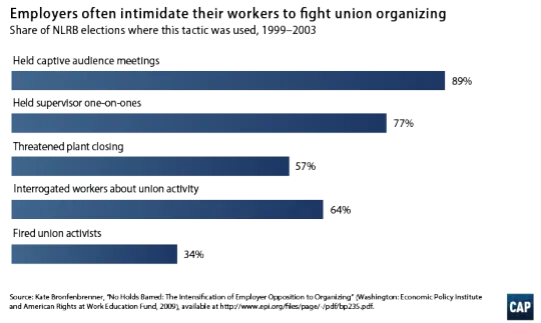Banning Captive Audience Meetings
We know that unions raise the standard of working conditions and wages for all workers, strengthen the overall economy and decrease inequality. Right now, only 6% of private sector workers are unionized, and 34% of public sector workers.
The Problem
Captive audience meetings are mandatory meetings held by an employer during work hours in order to pressure employees against joining a union, interrogate workers about the organizing campaign, and dis seminate union-bashing materials like videos and flyers. A 2009 study found that employers held captive audience meetings in 89% of union election campaigns between 1999 and 2003. This tactic is a major factor in why private sector unionization has fallen to 6.4%.
Today, 6.4% of private-sector employees in the United States are represented by a union, down from 35% in the 1950s. Yet, study after study shows that if workers had a free choice, they would choose to vote for a union. However, many union organizing campaigns fail due to intense union-busting by employers. Captive audience meetings are one of the key weapons for union-busting consultants and employers.
The win rate in union certification campaigns was 73%, but that figure dropped to 47% when management held captive audience meetings. Under existing labor law, anti-union captive audience meetings are perfectly legal: employers can require employees to attend captive audience meetings, discipline or discharge employees who refuse to attend, leave early, or ask questions, schedule as many meetings as they like, and hold meetings at any time during the workday as long as it is not within 24 hours of a scheduled election. On the other hand, unions have no right to hold their own meetings with workers on company property, nor are employers required to permit union organizers access to company property or employee lists! Recognizing this disparity in free speech opportunities, a number of states have proposed or passed legislation to prohibit employers from requiring employees to attend meetings on the subject of unionization. In 2009, Oregon became the first state to pass such a law and so far, it has withstood any legal challenges. Connecticut is also considering this legislation.

Protect Employee Freedom of Speech & Conscience (Reyes/Ramos)
Assembly bill sponsored by Assemblymember Reyes and Senate Bill sponsored by State Senator Jessica Ramos would prevent employers from retaliating against an employee for refusing to attend mandatory meetings on religious or political matters.
Materials